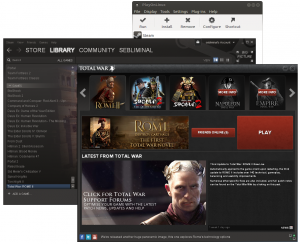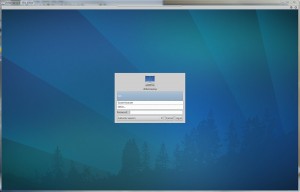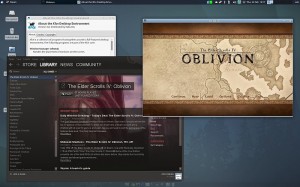The Chromium team have an automated build bot that generates builds every night; this short guide will explain how to get one of these nightly builds running in QEMU so you can try it out!
Category: Linux
-
Ubuntu tips and tricks
-
How to play Total War: Rome II on Linux (using PlayOnLinux, Wine and Steam, on Ubuntu 13.04)
 In case you didn’t know, Total War: Rome II is out now on Steam! It’s the latest game we’ve been working on (at Creative Assembly in the UK). This is a quick guide on getting Rome II running under Steam on Linux, using PlayOnLinux (a wine wrapper). Note: this won’t be using the native Linux version of Steam, this is specifically about running Rome II under Steam, running in a Wine environment.
In case you didn’t know, Total War: Rome II is out now on Steam! It’s the latest game we’ve been working on (at Creative Assembly in the UK). This is a quick guide on getting Rome II running under Steam on Linux, using PlayOnLinux (a wine wrapper). Note: this won’t be using the native Linux version of Steam, this is specifically about running Rome II under Steam, running in a Wine environment. -
Google Chrome Extension build script
 If you build Chrome extensions, you probably understand it’s a bit of a pain in the bum having to move all the files into the right place (especially if you have shared assets elsewhere), keep track of versions of your package, update your update.xml, and packaging it all up into a .crx and a .zip for publishing on the Chrome webstore. I found a it a pain in the bum anyway, so I wrote a bash script to simplify the build process a bit.
If you build Chrome extensions, you probably understand it’s a bit of a pain in the bum having to move all the files into the right place (especially if you have shared assets elsewhere), keep track of versions of your package, update your update.xml, and packaging it all up into a .crx and a .zip for publishing on the Chrome webstore. I found a it a pain in the bum anyway, so I wrote a bash script to simplify the build process a bit.It pumps out a .crx (signed with your .pem, ready for hosting on your site) and a .zip (ready for uploading to the Chrome Store).
-
Download Google Music tracks with wget from Chrome
 Google Music (or Google Play Music now!) is brilliant. It lets you upload 20,000 tracks to Google’s servers, available to play anywhere with a web browser, and streamable from your phone too.
Google Music (or Google Play Music now!) is brilliant. It lets you upload 20,000 tracks to Google’s servers, available to play anywhere with a web browser, and streamable from your phone too.However, sometimes it’s good to be able to listen to your music when you haven’t got an internet connection – the Android Music client supports “make available offline” for tracks, but the webpage doesn’t yet – so I wrote a small Chrome extension that generates a list of wget commands (and mv commands) to automate the process of downloading specific tracks from Google Music, ready for play offline.
-
Iptables firewall and SSH brute-force blocking with fail2ban on Ubuntu server
This is a quick howto to get an iptables firewall setup on Ubuntu server, with fail2ban enabled to block brute-force’d attempts at breaking in over SSH. I’m running this on Ubuntu 10.04 LTS, but it should work similarly on other versions.
Warning! If you get your iptables config wrong, you can end up blocking yourself out of your server, so be careful! Always best to have serial console access to the box just in case…
-
50gb of “cloud” space with Box, automatically sync’d on Ubuntu/Linux with webdav and unison
 Box (used to be box.net) is an online storage service that’s been around for a while – it’s quite popular and gives you more storage space than Dropbox usually does. And, if you’ve got an Android or iPhone, getting the mobile Box app (for Box.com) unlocks 50gb of storage immediately, for free. 50GB of storage. Unfortunately, it doesn’t have a linux syncing client yet – wouldn’t it be nice if you could create your own?
Box (used to be box.net) is an online storage service that’s been around for a while – it’s quite popular and gives you more storage space than Dropbox usually does. And, if you’ve got an Android or iPhone, getting the mobile Box app (for Box.com) unlocks 50gb of storage immediately, for free. 50GB of storage. Unfortunately, it doesn’t have a linux syncing client yet – wouldn’t it be nice if you could create your own? -
VNC from boot on Ubuntu 10.04 all the way to 14.04 without logging in, using LightDM (or GDM) and x11vnc (includes LUbuntu with lxdm and Linux Mint LMDE with mdm)
 In LUbuntu (and Ubuntu and XUbuntu) there are a number of fairly decent VNC servers, broadly split into 2 groups – 1 lot that let you view the existing desktop (i.e. remote control your existing session) and the other lot that create seperate X sessions that only exist under the VNC server. I’m interested in the first lot, and I’d like to be able to login to my X session over VNC before I’ve logged in on the box itself.
In LUbuntu (and Ubuntu and XUbuntu) there are a number of fairly decent VNC servers, broadly split into 2 groups – 1 lot that let you view the existing desktop (i.e. remote control your existing session) and the other lot that create seperate X sessions that only exist under the VNC server. I’m interested in the first lot, and I’d like to be able to login to my X session over VNC before I’ve logged in on the box itself. -
Steam and Oblivion under Linux (Ubuntu 11.10, Oneiric Ocelot) with Wine 1.4
 I’ve been playing quite a lot of Oblivion (Elder Scrolls IV) recently through Steam (I got the Game of the Year Edition, Deluxe on a Steam deal!). Usually I reboot into Windows for gaming but recently decided to give the latest versions of Wine a try to see how it runs under Linux. I’m running a fresh install of XUbuntu 11.10 (Ubuntu + XFCE) and this post is a brief guide on how to get Oblivion running smoothly with minimal hickups without having to reboot.
I’ve been playing quite a lot of Oblivion (Elder Scrolls IV) recently through Steam (I got the Game of the Year Edition, Deluxe on a Steam deal!). Usually I reboot into Windows for gaming but recently decided to give the latest versions of Wine a try to see how it runs under Linux. I’m running a fresh install of XUbuntu 11.10 (Ubuntu + XFCE) and this post is a brief guide on how to get Oblivion running smoothly with minimal hickups without having to reboot. -
Free cross-platform dynamic DNS with wildcards
This will roughly explain how to get wildcard DNS working for free (any-words-here.yoursubdomain.yourdomain.com) on a connection which gets assigned dynamic IPs. I’d like to make sure subdomain.example.com is always up to date with my home IP, and be able to request subdomains (like someword.subdomain.example.com) that resolve to the same IP. These are useful if you want to use multiple virtual hosts in apache hosted from a machine on your home network, accessible to the outside world using a fixed hostname.
